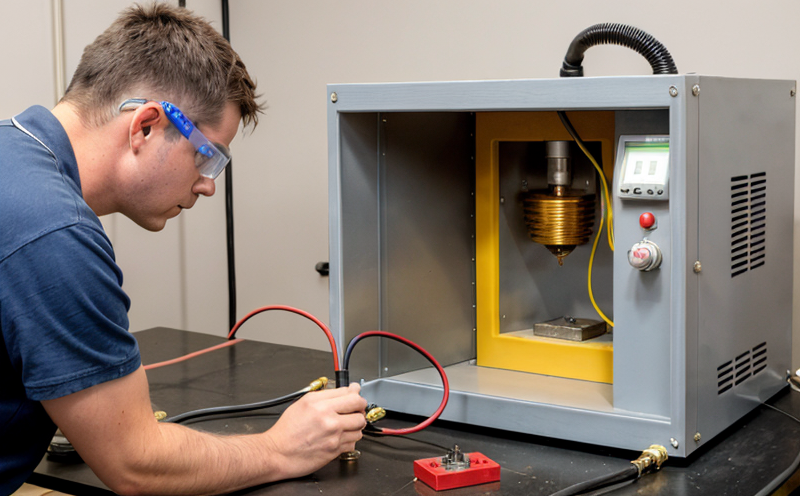ASTM A773 Soft Magnetic Properties Measurement
The ASTM A773 standard provides a comprehensive approach to measuring the soft magnetic properties of metals, ensuring that materials used in applications requiring high permeability and low coercivity meet stringent quality standards. This service is particularly vital for sectors like automotive, aerospace, and electronics, where performance reliability and efficiency are paramount.
ASTM A773 specifies a suite of tests designed to evaluate the magnetic properties of soft ferrous metals under various conditions. These tests include measurement of initial permeability (μi), saturation magnetization (Ms), remanence (Br), coercivity (Hc), and more. The standard emphasizes accuracy, reproducibility, and consistency in the evaluation process, which are critical for maintaining quality control throughout production cycles.
The testing procedure outlined by ASTM A773 involves careful preparation of specimens to ensure that they accurately represent the material's properties under test conditions. This includes considerations such as temperature stabilization, humidity control, and adherence to specific dimensions to avoid measurement errors. The use of high-precision equipment is essential for accurate results.
The tests conducted under ASTM A773 are not only relevant for raw materials but also extend to finished products. This ensures that the magnetic properties remain consistent from initial production stages through final assembly, thereby enhancing overall product reliability. The standard's focus on reproducibility and consistency is crucial in maintaining a high level of quality assurance across various manufacturing processes.
Understanding the soft magnetic properties of materials is essential for optimizing design parameters and ensuring that materials perform optimally under specified operating conditions. This service plays a critical role in R&D by providing insights into material behavior, which can lead to innovations in product design and performance improvements. For quality managers, this service offers valuable data points to monitor process variations and ensure adherence to specification limits.
ASTM A773 is widely recognized for its rigorous testing protocols, making it a preferred standard in the industry. Compliance with this standard enhances the reputation of manufacturers, ensuring that their products meet or exceed international quality standards. The service provided ensures that clients can trust the accuracy and reliability of test results, which is crucial for maintaining market competitiveness.
- Initial permeability (μi): Measures how easily a material allows magnetic flux to pass through it.
- Saturation magnetization (Ms): Indicates the maximum magnetization that can be achieved in a ferromagnetic material.
- Remanence (Br): Represents the residual magnetization after removal of an external magnetic field.
- Cochercivity (Hc): Measures the strength of the applied magnetic field required to demagnetize the sample.
Quality and Reliability Assurance
The ASTM A773 service is integral in ensuring that the soft magnetic properties of materials meet stringent quality standards. This service supports manufacturers by providing precise measurements that can be used to identify any deviations from specified tolerances, thereby enhancing product reliability.
Quality managers and compliance officers rely on this service to ensure consistency across production batches. By adhering to ASTM A773 protocols, they can verify that materials are within acceptable limits, reducing the risk of non-compliance issues down the line. For R&D engineers, this service offers valuable insights into material behavior under various conditions, enabling them to refine designs and optimize performance.
The accuracy and consistency provided by ASTM A773 testing contribute significantly to reliability assurance. This is especially important in high-stakes applications such as automotive components and aerospace parts, where any deviation from expected performance could lead to catastrophic failures. The service helps manufacturers maintain a high standard of quality, which is essential for meeting customer expectations and industry standards.
The service also supports procurement by ensuring that suppliers meet the required specifications. By leveraging ASTM A773 testing, procurement teams can verify that materials delivered are of the highest quality, reducing the likelihood of receiving substandard goods. This ensures that manufacturing processes remain smooth and efficient, minimizing downtime and costs associated with rework or replacement.
The rigor of ASTM A773 provides a robust framework for ensuring that soft magnetic properties meet the necessary criteria for safe and reliable performance. Compliance with this standard not only enhances product quality but also builds trust among customers and stakeholders. This is particularly important in sectors where safety and reliability are paramount, such as automotive and aerospace.
International Acceptance and Recognition
The ASTM A773 standard is widely recognized globally for its rigorous testing protocols. This service has gained international acceptance, making it a preferred choice for manufacturers across various sectors. Compliance with this standard enhances the reputation of clients by ensuring that their products meet or exceed international quality standards.
International recognition extends beyond mere compliance; it also underscores the reliability and consistency of test results provided by this service. This is particularly important in sectors where safety and performance are critical, such as automotive and aerospace. The standard's global acceptance ensures that clients can trust the accuracy and reliability of test results, which is crucial for maintaining market competitiveness.
The ASTM A773 service has been adopted by numerous organizations worldwide due to its comprehensive approach to soft magnetic properties measurement. This widespread adoption reflects the growing demand for precise and reliable testing in materials science. By adhering to this standard, manufacturers can ensure that their products are up-to-date with international best practices.
The service provided ensures that clients benefit from the latest advancements in test methodologies and equipment. This continuous improvement process helps maintain a high level of quality assurance across various manufacturing processes. The global acceptance of ASTM A773 further strengthens the reputation of manufacturers who choose to comply, enhancing their ability to meet customer expectations and industry standards.





